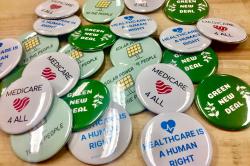
In addition to the High Road Fellowship, I'm also spending some time volunteering for a few electoral campaigns. Some of these campaigns are in primaries (Democrats vs. Democrats), and some are the standard Democrat vs. Republican races. The campaigns take place at the local, state, and federal level, all across the nation. Today's phone banking session was aimed toward voters in North Carolina, with respect to a set of Democrat vs. Republican elections. I was just making calls for a bit before I started writing this blog post, and while most of my encounters were with angry Republicans or ended in abrupt hang-ups, there was one conversation that I'd like to share with you all. I sat on the grass with my laptop and phone, putting on my most enthusiastic, vibrant voice.
"Hello! May I please speak with Mariah*?"
"Just one moment, ma'am," the other line replied. I heard some footsteps, and a loud "Mariah, PHONE!" in the background.
A young woman with a strong southern accent popped in. "Hi! Who's this?"
"Hi Mariah! How are you? My name is Leanna, and I'm calling with the Democratic Party..."
I went into my whole spiel—that I hope she's safe and well in these ~unprecedented times~, that we have informational resources in case she needs anything, and finished with, Is it okay if I ask you a few questions about the upcoming elections?"
"Yeah, sure," she replied.
"Great, thank you! Will you be voting for the Democratic slate?"
There was a pause. "Honestly, this may sound kind of stupid," Mariah began. "But I don't know a whole lot about politics. I don't even know if I'm a Democrat or a Republican." She trailed off with a slight laugh, but still seemed a bit uneasy.
If you've ever phone banked before, you probably know that there's a script to follow, and while you can (and should!) improvise when necessary, you shouldn't be spending too much time on any one call. Initial stages of phone banking—like the one that I was involved in - typically focus on information gathering and recruiting volunteers, rather than persuasion. As a result, there was no set dialogue in the script on how to approach an undecided voter, much less an apolitical one. But when you've been making calls for days and no one answers, you tend to jump at the slightest opportunity for conversation. And that's what I did.
"Please don't call yourself stupid!" I paused, trying to figure out where to go from there. "I know it's tough to pay attention sometimes. There's just so much happening!" There we go, a generic statement that she might be able to relate to. Now, time for an open-ended question to keep the conversation going. "But I'm happy to talk about it more if you'd like! Do you have any questions about politics?"
"Well, um...I just don't know a lot! I know some people in my town who like Trump—but I also know a few who don't—and I'm not sure what everyone is talking about." She continued, talking about the different people in her life and what they say, what type of media they consume, etc. I listened, with the occasional "mhm," and then we got to a real discussion.
Mariah and I ended up talking for about half an hour. There's too much to write here, but I ended up learning a lot about her. She's 19, she lives with her mother, two siblings, and niece, and she's currently out of work because of COVID. She talked about her experiences with local government officials and uneasiness with trusting them, and I opened up a little bit about my views on government. Our conversation wasn't really even about Democrats and Republicans at that point - it was about the human desire to be understood by the people who represent us, and to have our visions of justice and equity met on a broader, societal level. I know it sounds incredibly corny, but it's true, we had much more in common with each other than we initially thought, especially for two people who met through a political phone call.
So, if you ever meet someone who seems disinterested or disenchanted with politics, here's my unsolicited advice: talk to them about their lives, their friends and family, their values, and the things that matter most to them. And tell them about yourself. The personal is inherently political, and it's all the more necessary that we confront that truth. Chances are, there are existing or potential policies that would directly help them—ranging from reforms in healthcare, climate change, income and wealth inequality, and more—and we all have a role to play in making sure that such policies are enacted. Electoral organizing has its limits—clearly, we cannot vote away systemic oppression, especially if those who are the most marginalized are not even afforded the right to vote. But we can engage the populace through both electoral politics and direct action. We can get people activated, we can get them to think about things, and we can get them to care.
And finally, for both ourselves and the people we meet, we must remember: don't ever feel stupid. You know more than you think, and even though there's so much that you may still not fully be aware of, there's always an opportunity to learn.
*Name was changed for anonymity.
